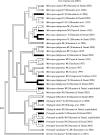The loss of anti-predator behaviour following isolation on islands
- PMID: 16087420
- PMCID: PMC1559846
- DOI: 10.1098/rspb.2005.3147
The loss of anti-predator behaviour following isolation on islands
Abstract
When isolated from predators, costly and no longer functional anti-predator behaviour should be selected against. Predator naiveté is often pronounced on islands, where species are found with few or no predators. However, isolation on islands involves other processes, such as founder effects, that might be responsible for naiveté or reduced anti-predator behaviour. We report the first comparative evidence that, in macropodid marsupials, isolation on islands may lead to a systematic loss of 'group size effects'-a behaviour whereby individuals reduce anti-predator vigilance and allocate more time to foraging as group size increases. Moreover, insular animals forage more, and are less vigilant, than mainland ones. However, we found no evidence that animals on the mainland are 'flightier' than those on islands. Remarkably, we also found no evidence that isolation from all predators per se is responsible for these effects. Together, these results demonstrate that anti-predator behaviour may indeed be lost or modified when animals are isolated on islands, but it is premature to assume that all such behaviour is affected.
Figures

References
-
- Beauchamp G. Group-size effects on vigilance: a search for mechanisms. Behav. Processess. 2003;63:111–121. - PubMed
-
- Bednekoff P.A, Lima S.L. Randomness, chaos and confusion in the study of antipredator vigilance. Trends Ecol. Evol. 1998;13:284–287. - PubMed
-
- Berger J, Swenson J.E, Persson I.-L. Recolonizing carnivores and naive prey: conservation lessons from Pleistocene extinctions. Science. 2001;291:1036–1039. - PubMed
-
- Blumstein D.T. Moving to suburbia: ontogenetic and evolutionary consequences of life on predator-free islands. J. Biogeogr. 2002;29:685–692.
Publication types
MeSH terms
LinkOut - more resources
Full Text Sources
